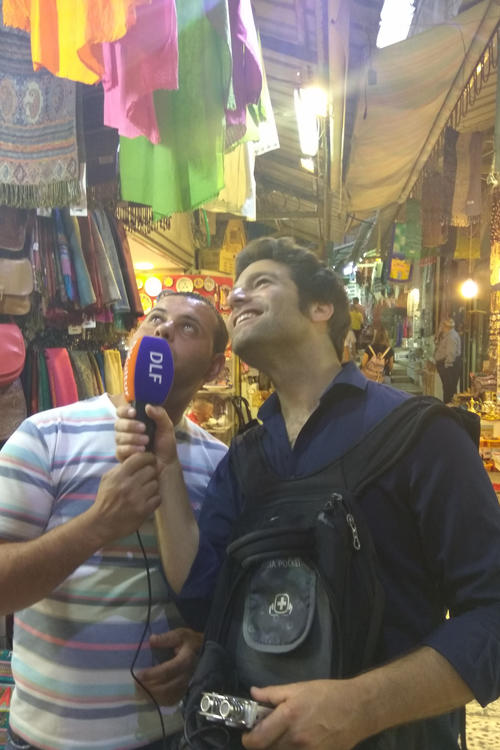“I hope that I am only the first of many”
The Israeli-German doctoral student Ofer Waldman has completed the first joint doctoral degree issued by Freie Universität Berlin and the Hebrew University in Jerusalem.
Jul 20, 2020
“His words are very painful to read, but fascinating,” is how Ofer Waldman describes the work of Thomas Brasch, a writer in former East Germany who belonged to the second generation of German communists of Jewish origin who settled in the Soviet occupation zone of Germany after World War II. In October 1949, the German Democratic Republic (GDR) was founded on the territory of the Soviet occupation zone.
While the parents held leading positions in the socialist state, their children often had more difficult relationships with the GDR. Thomas Brasch was arrested in 1968 for distributing leaflets against the Soviet Union’s suppression of the Prague Spring. After he moved to West Berlin in 1976, he published a well-known volume of stories, Vor den Vätern sterben die Söhne [The Sons Die before the Fathers].
In 2015, Freie Universität and Hebrew University signed agreement for joint doctorates
In his dissertation Zwischen Zerbrechen und Beschreiben: Der Dichter und Autor Thomas Brasch als Exponent der 2. Generation zur jüdisch-kommunistischen Remigration in die DDR [Between Breaking and Describing: The Poet and Writer Thomas Brasch as an Example of the Second Generation of the Jewish-Communist Remigration to the GDR], Ofer Waldman analyzed Thomas Brasch’s work in a historical context. Waldman successfully defended his dissertation in May, which incidentally had to take place online due to the coronavirus pandemic, and became the first individual to earn a doctorate issued simultaneously by Freie Universität Berlin and the Hebrew University of Jerusalem. The joint doctorate was made possible by an agreement that the universities signed in 2015 on the occasion of the 50th anniversary of the establishment of diplomatic relations between Germany and Israel. Although it was not a prerequisite, Ofer Waldman’s dissertation topic fits the partnership between the two universities.
... and Jerusalem’s Old Town while recording for the German public broadcasting station Deutschlandfunk.
Image Credit: Noam Brusilovsky
“I think it is wonderful that now, just five years later, the first joint doctorate has been completed,” said Susanne Zepp, a professor of Romance languages and literatures at Freie Universität. Zepp is the academic coordinator of the partnership with Hebrew University and was involved in the conclusion of the agreement in 2015. The two universities have been cooperating even longer than the two governments. The first contacts were made in 1957 through letters initiated by a group of students at Freie Universität. The group referred to itself as Deutsch-Israelische Studiengruppe (DIS, “German-Israeli Study Group”) and was interested in promoting diplomatic relations with Israel. In 1963 Shlomo Aronson came to Freie Universität and became the first Israeli to earn a doctorate in Germany. “Academic cooperation paved the way for the two countries to move closer together,” says Susanne Zepp.
Oron Shagrir, the vice president for international affairs of the Hebrew University of Jerusalem, says “We congratulate Ofer Waldman on the successful completion of his PhD, and are particularly proud as he is our first student to graduate in the framework of the Freie Universität Berlin and Hebrew University of Jerusalem’s Joint PhD Program.” Furthermore, Shagrir says, “Ofer is a testament to the vibrant, strategic, and long-standing partnership between Freie Universität Berlin and Hebrew University, and to its joint potential to educate and train a young generation of talented researchers and academics, in Germany and Israel, who can serve as a bridge between our two countries.”
A New Look at German Post-World War II History
“Both universities, both supervisors, both disciplines, both cities complemented each other very well,” says Ofer Waldman. Literary scholar Jürgen Brokoff supervised his dissertation in Berlin, and historian Yfaat Weiss in Jerusalem. At Freie Universität Waldman took seminars on GDR literature and history, and he spent a lot of time in archives. Just staying in Berlin helped him, says Ofer Waldman because “Thomas Brasch was a Berliner. Living in his city and speaking to contemporary witnesses was essential.”
At Hebrew University, the oldest university in Israel, Waldman not only received excellent training, but also gained a specific Israeli perspective on the subject. “I would have written this work differently if I had come from Bonn or Munich,” says Ofer Waldman.
A non-German view of German post-war history is important to him. The biography of Thomas Brasch presented a challenge for previous representations of the German-Jewish conversation, which were dominated by the Federal Republic of Germany. Waldman points out that there were not only Günter Grass, Marcel Reich-Ranicki, Daniel Cohn-Bendit, and Michel Friedman, but also Thomas Brasch, Barbara Honigmann, und Jurek Becker, the latter all GDR writers of Jewish origin.
To classify them all as dissidents or as disillusioned is incorrect, according to Waldman. He says, “They grew up in a state that their parents helped to build as a response to fascism, so it was only natural to identify with this state to some extent.” Yet, at the same time, they also fell victim to state repression. In 1968 Thomas Brasch was handed over to state security agents by his own father. Years later he wrote to his father that he remained committed to his actions, but he also understood why he had to go to prison for them. Ofer Waldman says, “That is not disillusionment, it is tragedy.”
Berlin Is Second Home Now
Susanne Zepp is convinced that the opportunity to earn joint doctorates will strengthen the links between Freie Universität and Hebrew University. “A doctorate is an important milestone in the intellectual biography of a young scholar,” she says. Furthermore, “you feel particularly connected to the university where you did your doctorate.”
Ofer Waldman’s life is shaped by intercultural exchange. A trained musician, he was a horn player in the Arab-Israeli West-Eastern Divan Orchestra, which was founded in 1999 by the conductor Daniel Barenboim and the literary scholar Edward Said. In 1999 Waldman moved to Berlin for the first time. There he studied at the Berlin University of the Arts and played in the Berlin Radio Symphony Orchestra. Today he lives with his family in a small Israeli town. One of his daughters was born shortly before he started working on his doctorate, and she will soon be in first grade.
Ofer Waldman spends about a week a month in Berlin, where he works as a freelance writer for Deutschlandfunk and is involved in Israeli human rights organizations such as the New Israel Fund Germany. Berlin is his adopted second home now.
Ofer Waldman says that his biography would be quite different without the cooperation of the two universities. “The exchange facilitates very close connections independent of government consultations and nice Sunday speeches,” he says. “I hope that I am only the first of many to earn a joint doctorate from these two wonderful universities.”


